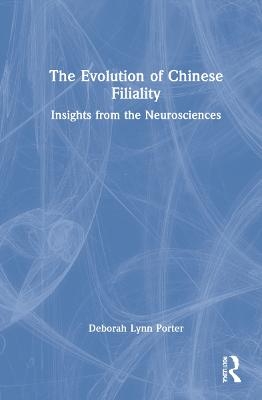
The Evolution of Chinese Filiality
Insights from the Neurosciences
Seiten
2022
Routledge (Verlag)
978-1-032-10398-3 (ISBN)
Routledge (Verlag)
978-1-032-10398-3 (ISBN)
This unique book brings a fresh interdisciplinary approach to the analysis of ancient Chinese history, creating a historical model for the emergence of cultural mainstays by applying recent dramatic findings in the fields of neuroscience and cultural evolution.
The centrality in Chinese culture of a deep reverence for the lives of preceding generations, filial piety, is conventionally attributed to Confucius (551-479 B.C.), who viewed hierarchical family relations as foundational for social order. Here, Porter argues that Confucian conceptions of filiality themselves evolved from a systemized set of behaviors and thoughts, a mental structure, which descended from a specific Neolithic mindset, and that this psychological structure was contoured by particular emotional conditions experienced by China’s earliest farmers. Using case study analysis from Neolithic sky observers to the dynastic cultures of the Shang and Western Zhou, the book shows how filial piety evolved as a structure of feeling, a legacy of a cultural predisposition toward particular moods and emotions that were inherited from the ancestral past. Porter also brings new urgency to the topic of ecological grief, linking the distress central to the evolution of the filial structure to its catalyst in an environmental crisis.
With a blended multidisciplinary approach combining social neuroscience, cultural evolution, cognitive archaeology, and historical analysis, this book is ideal for students and researchers in neuropsychology, religion, and Chinese culture and history.
The centrality in Chinese culture of a deep reverence for the lives of preceding generations, filial piety, is conventionally attributed to Confucius (551-479 B.C.), who viewed hierarchical family relations as foundational for social order. Here, Porter argues that Confucian conceptions of filiality themselves evolved from a systemized set of behaviors and thoughts, a mental structure, which descended from a specific Neolithic mindset, and that this psychological structure was contoured by particular emotional conditions experienced by China’s earliest farmers. Using case study analysis from Neolithic sky observers to the dynastic cultures of the Shang and Western Zhou, the book shows how filial piety evolved as a structure of feeling, a legacy of a cultural predisposition toward particular moods and emotions that were inherited from the ancestral past. Porter also brings new urgency to the topic of ecological grief, linking the distress central to the evolution of the filial structure to its catalyst in an environmental crisis.
With a blended multidisciplinary approach combining social neuroscience, cultural evolution, cognitive archaeology, and historical analysis, this book is ideal for students and researchers in neuropsychology, religion, and Chinese culture and history.
Deborah Porter is Professor of Global Studies at the Jackson School of International Studies. Her interdisciplinary research on the impact of shameful secrets on cultural production spans a wide swath of time and geography, including Early China, and fifteenth- and sixteenth-century Western Europe, Russia and Korea.
1. Introduction 2. SEEKING a Chinese Filial Mind Module 3. The Evolution of a Chinese Nervous System 4. Ecological Inheritance, Prestige and the Evolution of a Chinese Leadership Mindset 5. The Deep History of the Western Zhou Ritual Reform 6. Neurohistory, Filiality and Historical Change in China
| Erscheinungsdatum | 14.03.2022 |
|---|---|
| Zusatzinfo | 1 Tables, black and white; 16 Line drawings, black and white; 6 Halftones, black and white; 22 Illustrations, black and white |
| Verlagsort | London |
| Sprache | englisch |
| Maße | 156 x 234 mm |
| Gewicht | 453 g |
| Themenwelt | Geisteswissenschaften ► Archäologie |
| Geisteswissenschaften ► Religion / Theologie ► Weitere Religionen | |
| Naturwissenschaften ► Biologie ► Humanbiologie | |
| Naturwissenschaften ► Biologie ► Zoologie | |
| ISBN-10 | 1-032-10398-1 / 1032103981 |
| ISBN-13 | 978-1-032-10398-3 / 9781032103983 |
| Zustand | Neuware |
| Informationen gemäß Produktsicherheitsverordnung (GPSR) | |
| Haben Sie eine Frage zum Produkt? |
Mehr entdecken
aus dem Bereich
aus dem Bereich
archäologische Fakten und Fiktionen im Neuheidentum
Buch | Softcover (2023)
Verlag Anton Pustet
CHF 36,90


